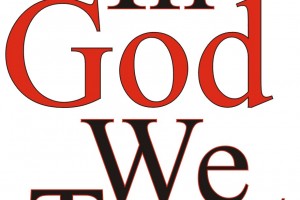 Mark 10:17-31
Mark 10:17-31
In God we trust.
Seems ironic that my sermon ended up here, with the Gospel that is printed on our money as the symbol of this week’s challenge. After all, money is so often where the real struggle lies.
But let’s not go there quite yet—first, some other issues. Trust God—what does it mean? That’s a tricky question because, as I described in the sermon, we often deceive ourselves by placing limits on how much trust God deserves. God can be trusted with certain things, like salvation, while other aspects of life—money, politics, lifestyle—are ours to command. Imagining that God is okay with this division of labor, for safety’s sake we set up a bargain with God’s job being to protect us from danger while we keep up our end of the deal by being good or praying, or some such promise. Safety is the point; predictability is good, and what’s most important is that we don’t have change anything in order to be God’s people.
If the rich man was part of this sort of faith bargain, he seems to recognize that it is no longer working for him. That he kneels before Jesus and asks his questions indicates that he knows something is wrong. But what? The usual answers don’t connect. Jesus makes no mention of repentance or forgiveness because he’s not burdened with guilt—in fact the opposite seems to be the case. His life seems filled with goodness—good deeds, good blessings—and yet that goodness is not enough. Perhaps he experiences an emptiness in spite of all that? At any rate, Jesus has the cure:
Go, sell everything you have, give to the poor and come follow me.
Why would Jesus say that? It’s an answer that shocks everyone around him. Twice he has to explain himself. Part of the confusion is probably due to the fact that riches then (and now) were seen as a sign of God’s favor and blessing. So how can this rich man, so blessed by God, not be part of the Kingdom? It’s impossible for this guy with all his advantages to get into the Kingdom? Jesus’ disciple Peter is so shocked that he seems to need some reassurance that he is on the right track.
At this point, conventional theological interpretations can get in our way. Usually we point to Jesus’ line, “With God all things are possible,” and breath a sign of relief. It’s all about grace, the undeserved gift that puts us in God’s favor. The rich can’t earn their way into heaven; that’s all Jesus is saying. We knew that; we’re safe, back to life as we know it.
That’s sort of true, but we’re ignoring the story. Maybe the rich man can’t earn his way into heaven, but Jesus does give him something he can do that will bring him into the Kingdom. Remember—his life, as good and blessed as it is, isn’t working. Jesus invites him into a life that will. His invitation offers a way of faith that gives freedom, but not safety. Jesus invites us to enter the Kingdom with our whole life, not just with the what-happens-after-death part. But upon entering the Kingdom, we’ll be trusting in more than the theological concept of justification by grace. It’s our life now, with all its resources, issues and stuff that Jesus has in hi sights. Jesus’ answer challenges the faith bargain first with the realization that God has never signed on to this plan, but also with the awareness that it is when we give up the limits on God’s presence and our expectations of predictability that this spiritual life gets interesting. So is it true? Does letting go of excuses and stuff give us what we are looking for?
At this point, I’m going to be quiet and let other theologians of Trinity take over. Here’s Cassie’s story:
I was waiting to read the blog on today’s sermon to make this comment, but, then I got too excited. The parable of the rich man really resonates with me. Five years ago, I gave everything up: a home, a car, a business, a marriage, a 401K, a retirement, a future, health insurance, and an income. It was not by choice. Well, it was, in a way. I decided to give all those things up to save my life, and Maxine’s. It was not a grand call from God, it was SURVIVAL. While I felt at the time that it was a major loss, I now see it as a benefit. While I was in the “box”, I was worried about losing things. I fought to keep my “things”. Once I was forced to give up all my things, or “sell all you have and give it to the poor”, I finally experienced true freedom. I am now free. I don’t have to keep up with anyone, I gave that up! I do not even expect to have a car, but I’m thrilled that I do have one. Everything I have is a blessing now, and I am now doing more now to help other people then I ever have in my life. Not my choice, but in losing MY life, I Gained It! I have my life back. I can be ME, and I have the freedom to help others. I feel like letting go of the conventional property in life, let me see what really matters, and what exists. Tomorrow is a hypothetical, today is real. I don’t think anyone reasonable would give EVERYTHING up, but it does have it’s advantages. For one, you can go after what you really want, for another, you can act like Christ without worrying what it will do to your HOA.
That’s a dramatic witness, worthy of this dramatic Gospel story. How do you know it’s good news for you? Could we be missing something with our faith bargains?
Any other stories? Trust God–how’s that working for you?
